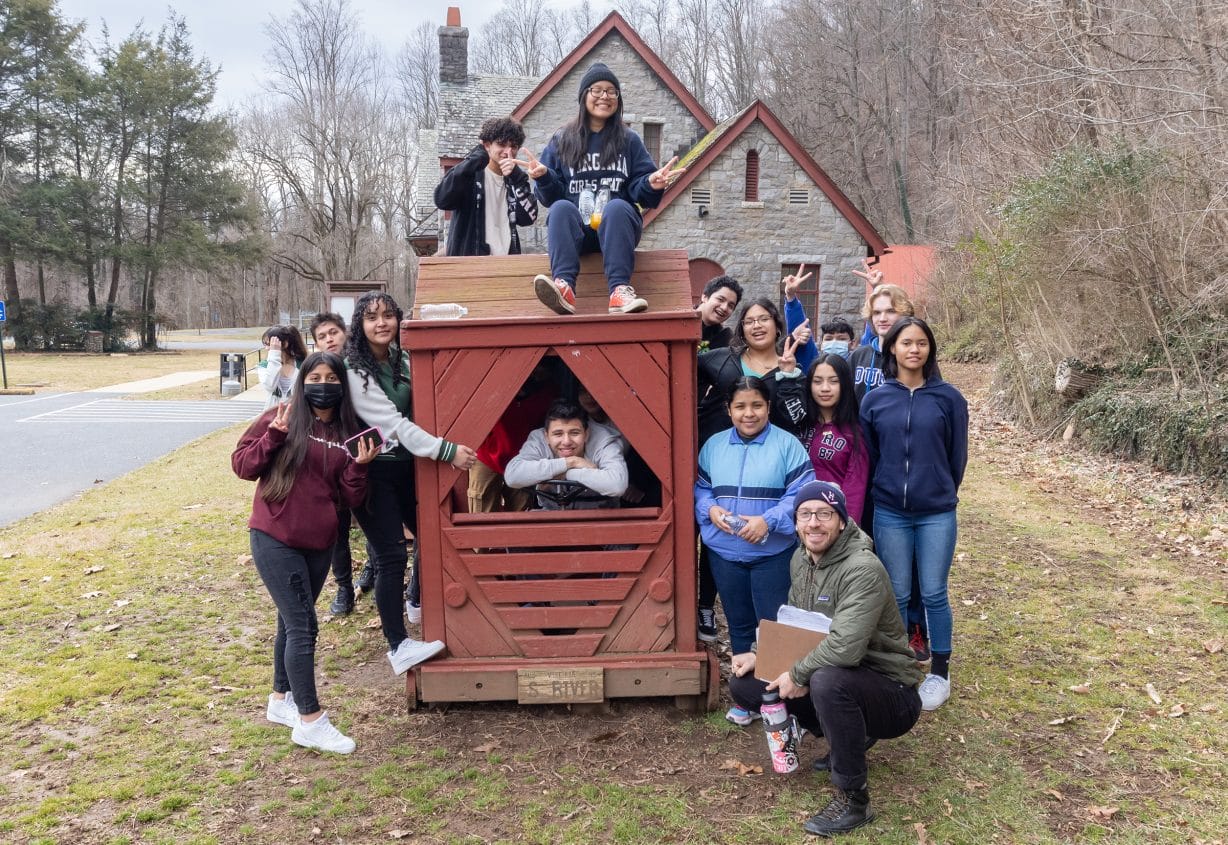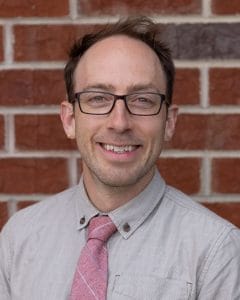
By Haley Thomas, contributor
Erich Sneller, assistant director of the governor’s STEM academy and teacher at Harrisonburg High School, is up for a national teaching award.
As for what got him here, he attributes it to this: “I think it’s my nature and how I was raised. Whatever you do, give it all you can. And that’s what a meaningful life is.”
Sneller is one of Virginia’s five finalists for the 2023 Presidential Award for Excellence in Mathematics and Science Teaching. It is the nation’s top honor for exceptional STEM teachers who show superior dedication to their content area and their students.
Myron Blosser, director of the Governor’s STEM Academy at Harrisonburg High, nominated Sneller. Blosser won the national award himself in 2019 and is the only other Harrisonburg math and science teacher to win this presidential award.
“Part of the nomination was simply to acknowledge what I see in him already, and part of it was to provide a platform for him to continue to grow as an educator,” Blosser said. “It was exciting for me to sit down and have to actually put into words what I have come to realize working with Erich over these last couple of years. It was actually a fun activity for me to put down on paper what I saw in Erich that makes me think he would be a great awardee.”
The award covers five criteria:
- Mastery of content appropriate for the grade level being taught.
- Meaningful teaching approach.
- Effective assessment of student learning.
- Use of reflective practices.
- And leadership and equity in and out of the classroom.
Sneller said he was honored to be named a state finalist, and Blosser’s nomination affirmed that he’d made an impact in his eight years at Harrisonburg High.
“It felt so good to know that he views me as someone who’s currently a leader, but also has the capacity to further grow in my role,” Sneller said.
Sneller not only has to stay current on the science he teaches, but he also conveys the material in two languages. He teaches environmental science in Spanish and chemistry in English.
Blosser said Sneller applies what research says is best practice in both subjects “better than anyone I know.”
“I saw right away that he does have a growth mindset and he’s malleable,” Blosser said. He added that Sneller has a philosophy that says “a rising tide lifts all boats.”
He doesn’t just want to improve education for himself and his students — he wants to improve education as a whole, Blosser added.
Blosser said it’s common for teachers to close their doors during class time, but Sneller’s door is always open. He’s in and out, constantly collaborating with other teachers and students, even ones who aren’t in his classes.
“He really has this coaching mentality, even at such a young age, that really has impacted the school in significant ways,” Blosser said. “He’s willing to share and enable others around him.”
Michael Richards, superintendent of Harrisonburg City Public Schools, agreed.
“He’s a leader, he’s bilingual, he’s passionate about his students,” Richards said. “If he doesn’t win the national award, he’s already impressed us all.”
‘Affect peoples’ lives in meaningful ways’
Before going to college, Sneller said he asked himself a question: “How can I use my time and energy in a way where I get to share what I’m passionate about and where it’s meaningful for others?”
That led him to discover his passion for teaching.

Sneller graduated from Iowa State University in 2014 with a bachelor’s degree in both environmental science and agronomy and soil science. He graduated on a Saturday, and the following Monday, began his master’s of arts in teaching program with an emphasis in science.
On the first day of his graduate program, Sneller said his professor asked the class, “Why are you here?”
He said he thought, “to be a teacher, duh.”
But his professor told the class to come up with really good reasons for why they wanted to be a teacher, or one of two things could happen: burning out prematurely, or worse, damaging children.
He said this was the key that made him realize that teachers “raise the youth of our nation, and that isn’t something to be taken lightly.”
Sneller completed the graduate program and came to Virginia in 2015. He said once he began teaching at Harrisonburg High, he knew he’d made the right career choice.
“I get to do things that affect people’s lives in meaningful ways,” Sneller said, adding that this has always been a goal. “For some kids, that might just be helping them believe in themselves… For others it might be helping them learn more about where they live and what’s under their feet. I think the number one thing is getting to help people. I know that’s what motivates me the most.”
Sneller later added in an email to The Citizen that his colleagues, family and friends make what he does possible.
“There is no PAEMST award without their collaboration and support,” Sneller wrote. “Their love and support replenishes my spirit to teach.”
Getting students excited about science
As director and assistant director of the Governor’s STEM Academy, Blosser and Sneller are “like minds who have no limits,” Blosser said.
If a project benefits their students, they’re willing to go for it — even over summer break.
Camp FIRE (Fueling Intrigue, Research and Excitement) is a week-long camping trip that Blosser and Sneller take with students. Each summer, they camp in different locations and fill their days with hiking, cave exploring and performing research.
Another recent project that Blosser and Sneller coordinated was a high-altitude balloon launch. With students’ help, they filled a balloon with helium and attached a variety of scientific research equipment and a GPS. When the balloon pops at around 100,000 feet above Earth, the equipment floats down with its parachute and, once located by the GPS, students can review the data it’s collected.
The Governor’s STEM Academy recently collaborated with JMU to isolate viruses from soil samples acquired by students. Blosser said several of he and Sneller’s students have discovered unheard of viruses, then had the opportunity to name them.
Blosser said he and Sneller thrive on sharing their passion for science with students.
“It’s kind of like walking,” Blosser said. “Every time you take a step, you’re off balance. And if you don’t have that off-balance feeling, you’ll never move forward. It’s that idea of constantly pursuing and pushing the envelope where you’re a little off balance, because that’s where movement happens and that’s really where the excitement is.”
He said Sneller lives by getting his students excited about science.
“For me, as far as a science teacher goes, that’s what I would classify a good teacher as: one who enables their students to be actively involved by doing relevant science,” Blosser said.
Sneller said he loves to see what students remember from his class after he hasn’t seen them for a while. He said he recently saw one of his past students who’s now studying at JMU and asked if he remembered q = mcΔT.
“He just laughed at me. I knew he wouldn’t remember a thermodynamics equation,” Sneller said. “But he said that he remembers how to solve problems scientifically.”
That, Sneller said, is more than enough for him.
‘Grateful whether or not I win’
After Sneller’s nomination came the application process, which he said included a 30-minute video of classroom instruction, an around 20-page written response and three letters of recommendation that describe how his work supports the five dimensions of outstanding teaching.
Now that state finalists have been announced, up to 108 exemplary teachers will be selected to win the award. Each winner will receive a certificate signed by the United States president, a $10,000 award from the National Science Foundation and an all-expenses-paid trip to an award ceremony in Washington, D.C.
When Sneller announced to his students he was a finalist and a potential winner of $10,000, he said his students were thrilled. He made a promise to bring them candy if he wins, although many of them asked for a share of the prize money.
Sneller said if he wins, he plans to use a chunk of the prize money to apply to become a facilitator with the Center for Courage and Renewal, an organization he called his “philosophical and spiritual home for education.”
The Center for Courage and Renewal holds virtual and in-person programs that help others cultivate their “inner teacher.” Sneller has participated in three of the center’s programs.
“In all of the programs, we find ways to see where we’re resilient in our lives and where we can grow more, personally and professionally. That’s something that I want to learn how to do for others,” Sneller said. “I’m enamored with this organization.”
Blosser told The Citizen he wasn’t shocked that Sneller would use his award money for professional and personal development.
“That just reeks of Erich right there,” Blosser said with a laugh.
Awardees also join the cohort of winners and gain access to professional development opportunities and discussions with policy makers on how to improve STEM education. Blosser said this has been one of the most rewarding aspects since his win and that he’s still active in his cohort of winners from 2019.
“Being a part of that group of awardees really does move the needle on you as a professional,” Blosser said. “I thought that if [Sneller] could become part of this community of award winners, that would escalate his growth.”
While Sneller said being named a finalist for a national award has been an honor, he said the important part is how he uses the experience to further the efforts he’s working toward.
“The award would be a nice little feather in the cap, but the process itself was really invigorating and challenging,” Sneller said, adding that going through the application process alone has made him a better educator. “Anytime I have to justify why I do what I do and explain my rationale, it makes me more intentional. So even for just that, I’m grateful whether or not I win.”
Journalism is changing, and that’s why The Citizen is here. We’re independent. We’re local. We pay our contributors, and the money you give goes directly to the reporting. No overhead. No printing costs. Just facts, stories and context. We’re also a proud member of the Virginia Press Association. Thanks for your support.













